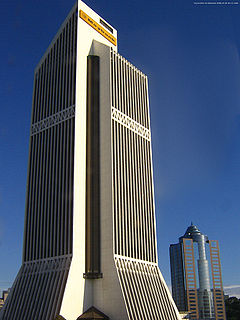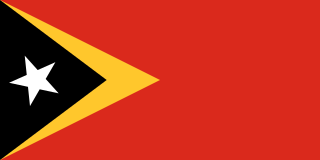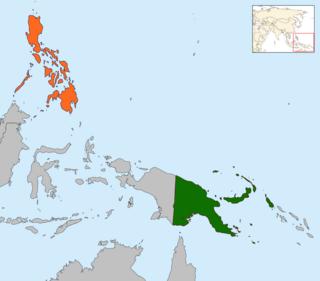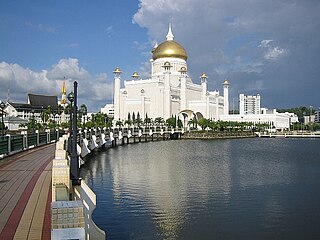
Since independence, Indonesian foreign relations have adhered to a "free and active" foreign policy, seeking to play a role in regional affairs commensurate with its size and location but avoiding involvement in conflicts among major powers. Indonesian foreign policy under the "New Order" government of President Suharto moved away from the stridently anti-Western, anti-American posturing that characterised the latter part of the Sukarno era. Following Suharto's ouster in 1998, Indonesia's government has preserved the broad outlines of Suharto's independent, moderate foreign policy. Preoccupation with domestic problems has not prevented successive presidents from travelling abroad.

Papua New Guinea, officially the Independent State of Papua New Guinea, is a sovereign state in Oceania that occupies the eastern half of the island of New Guinea and its offshore islands in Melanesia, a region of the southwestern Pacific Ocean north of Australia. Its capital, located along its southeastern coast, is Port Moresby. The western half of New Guinea forms the Indonesian provinces of Papua and West Papua. It is the world's third largest island country with 462,840 km2 (178,700 sq mi).

Southeast Asia or Southeastern Asia is the southeastern region of Asia, consisting of the regions that are geographically south of China, east of the Indian subcontinent and north-west of Australia. Southeast Asia is bordered to the north by East Asia, to the west by South Asia and the Bay of Bengal, to the east by Oceania and the Pacific Ocean, and to the south by Australia and the Indian Ocean. The region is the only part of Asia that lies partly within the Southern Hemisphere, although the majority of it is in the Northern Hemisphere. In contemporary definition, Southeast Asia consists of two geographic regions:
- Mainland Southeast Asia, also known historically as Indochina, comprising Cambodia, Laos, Myanmar, Peninsular Malaysia, Thailand and Vietnam.
- Maritime Southeast Asia, also known historically as Nusantara, the East Indies, or the Malay Archipelago, comprising the Andaman and Nicobar Islands (India), Ashmore and Cartier Islands (Australia), Brunei, Christmas Island (Australia), the Cocos (Keeling) Islands (Australia), East Malaysia, East Timor, Indonesia, the Philippines and Singapore.

The Association of Southeast Asian Nations is a regional intergovernmental organization comprising ten countries in Southeast Asia, which promotes intergovernmental cooperation and facilitates economic, political, security, military, educational, and sociocultural integration among its members and other countries in Asia.

Papua New Guinea's foreign policy reflects close ties with Australia and other traditional allies and cooperative relations with neighboring countries. Its views on international political and economic issues are generally moderate. Papua New Guinea has diplomatic relations with 56 countries.

Malayan Banking Berhad is a Malaysian universal bank, with key operating "home markets" of Malaysia, Singapore, and Indonesia. According to the 2020 Brand Finance report, Maybank is Malaysia's most valuable bank brand, the fourth top brand in Asean and ranked 72nd in the world’s most valuable bank brands.
The ASEAN Declaration or Bangkok Declaration is the founding document of Association of Southeast Asian Nations (ASEAN). It was signed in Bangkok on 8 August 1967 by the five ASEAN founding members, Indonesia, Malaysia, Philippines, Singapore, and Thailand.

The ASEAN Para Games is a biannual multi-sport event held after every Southeast Asian Games involving disabled athletes from the current 11 Southeast Asia countries. Participating athletes have a variety of disabilities ranging from spastic, cerebral palsy, mobility disabilities, visual disabilities, amputated to intellectual disabilities. The ASEAN Para Games is under the regulation of the ASEAN Para Sports Federation (APSF) with supervision by the International Paralympic Committee (IPC) and the Asian Paralympic Committee and is traditionally hosted by the country where the Southeast Asian Games took place.

The ASEAN Summit is a biannual meeting held by the members of the Association of Southeast Asian Nations (ASEAN) in relation to economic, political, security, and socio-cultural development of Southeast Asian countries. In addition, it serves as a prominent regional (Asia) and international (worldwide) conference, with world leaders attending its related summits and meetings to discuss various problems and global issues, strengthening co-operation, and making decisions. The summit has been praised by world leaders for its success and ability to produce results on a global level.

The East Asia Summit (EAS) is a regional forum held annually by leaders of, initially, 16 countries in the East Asian, Southeast Asian, South Asian and Oceanian regions, based on the ASEAN Plus Six mechanism. Membership expanded to 18 countries including Russia and the United States at the Sixth EAS in 2011. Since its establishment, ASEAN has held the central role and leadership in the forum. EAS meetings are held after the annual ASEAN leaders' meetings, and plays an important role in the regional architecture of Asia-Pacific. The first summit was held in Kuala Lumpur, Malaysia on 14 December 2005.
The ASEAN Common Time (ACT) is a proposal to adopt a standard time for all Association of Southeast Asian Nations member states. It was proposed in 1995 by Singapore, and in 2004 and 2015 by Malaysia to make business across countries easier. The proposal failed because of opposition in Thailand and Cambodia.

As of 2010, the Association of Southeast Asian Nations (ASEAN) has 10 member states, one candidate member state, and one observer state.

The Brunei Darussalam-Indonesia-Malaysia-Philippines East ASEAN Growth Area (BIMP-EAGA) was launched in 1994 in Davao City. It is located in one of the world's most resource-rich areas in Southeast Asia and includes the Heart of Borneo and the Sulu-Sulawesi Marine Ecoregion.

The accession of East Timor to the Association of Southeast Asian Nations is a process that started following the independence of the country in 2002 when its leaders stated that it had made a "strategic decision" to become a member state of Association of Southeast Asian Nations (ASEAN) in the future. Closer ties with ASEAN are supported by all political parties in East Timor. East Timor would have by far the smallest GDP in the ASEAN, less than 15% of the smallest current ASEAN member state Laos.

The Enlargement of the Associationof Southeast Asian Nations is the process of expanding the Association of Southeast Asian Nations (ASEAN) through the accession of new member states. This process began with ASEAN's five original members, who founded the association through the signing of Bangkok Declaration in 1967. Since then, the ASEAN's membership has grown to ten with the accession of Cambodia in 1999.

Papua New Guinea–Philippines relations refers to the bilateral relations of Papua New Guinea and the Philippines. Papua New Guinea has an embassy in Manila and the Philippines has an embassy in Port Moresby, which is also accredited to the Solomon Islands, Vanuatu and Fiji.

The US-ASEAN Business Council is a leading advocacy group that aims to foster economic growth and trade ties between the United States and the Association of Southeast Asian Nations (ASEAN)'s ten member countries. It is the only U.S.-based organization enshrined in the ASEAN charter. Headquartered in Washington, DC, the Council has offices in New York City, Indonesia, Malaysia, Philippines, Singapore, Thailand, Vietnam, and Myanmar. The Council represents more than 160 of the largest US corporations.

Tourism in Brunei is governed by the Ministry of Primary Resources and Tourism, which is planning to diversify Brunei's tourism to include adventure tourism, ecotourism and Islamic tourism.

The 2020 ASEAN Para Games, officially known as the 10th ASEAN Para Games, is a cancelled biannual multi-sport event for athletes with physical disabilities which was intended to be held after the 2019 Southeast Asian Games in the Philippines. Participants were expected from 11 countries in Southeast Asia. The games, patterned after the Paralympics, was to include athletes with various disabilities.

















